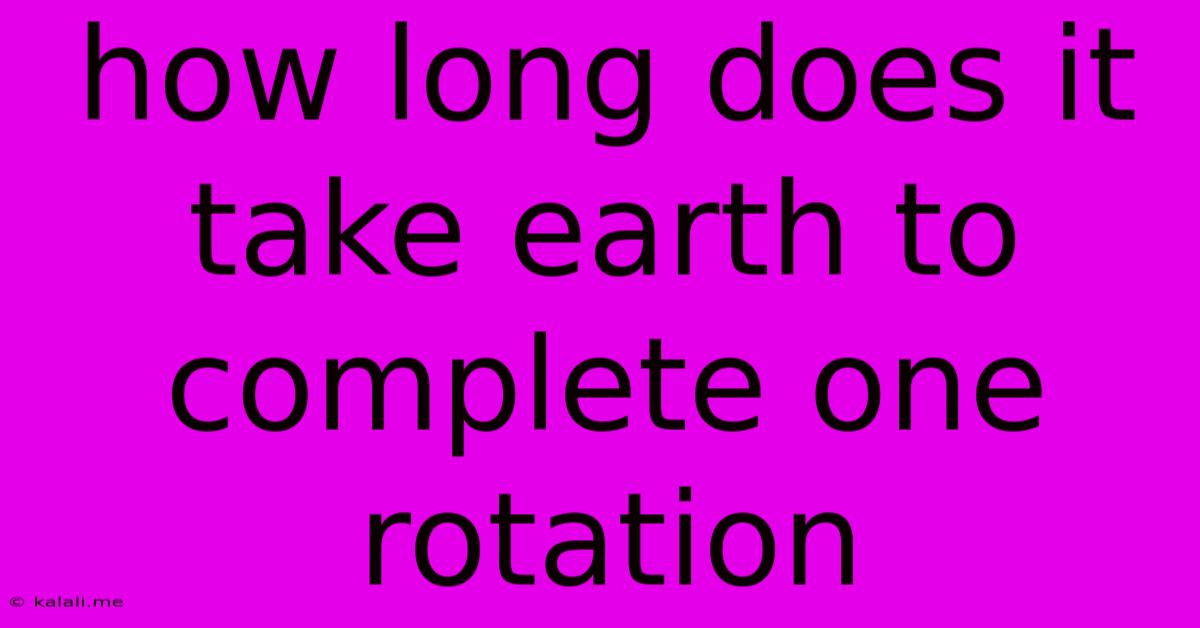How Long Does It Take Earth To Complete One Rotation
Kalali
Jun 13, 2025 · 3 min read

Table of Contents
How Long Does it Take Earth to Complete One Rotation? It's Not as Simple as You Think!
Meta Description: Discover the fascinating complexities behind Earth's rotation. Learn about sidereal vs. solar days, the influence of the moon, and why a precise answer isn't as straightforward as you might expect.
Earth's rotation is something we take for granted. We experience day and night, the sun seemingly rising and setting with clockwork precision. But how long does it actually take our planet to spin once on its axis? The answer, surprisingly, isn't a single, simple number. It depends on what you're measuring.
Understanding Sidereal and Solar Days
The confusion arises from two different ways to measure a complete rotation:
-
Sidereal Day: This refers to the time it takes Earth to complete one full 360-degree rotation relative to the fixed stars. This is approximately 23 hours, 56 minutes, and 4 seconds. This is the true period of Earth's rotation.
-
Solar Day: This is the time it takes for the Sun to appear in the same position in the sky, which is what we experience as a day. This is approximately 24 hours. The difference stems from Earth's simultaneous orbit around the Sun. As Earth rotates, it also moves a small distance along its orbit, meaning it needs to rotate slightly more than 360 degrees to bring the Sun back to the same position in the sky.
Think of it like this: imagine running around a track while the track itself is also slowly moving. You'll need to run a little further than a full lap to reach the same starting point relative to a fixed point outside the track.
Factors Affecting Earth's Rotation
Earth's rotation isn't perfectly consistent. Several factors influence its speed, causing slight variations in the length of a day:
-
Gravitational interactions with the Moon: The Moon's gravitational pull exerts a tidal force on Earth, causing a slight slowing down of its rotation over geological time. This effect is incredibly small, but measurable. Over millions of years, it has lengthened our day.
-
Core-mantle interactions: The Earth's core and mantle interact in complex ways that affect the planet's rotation rate. Changes in the flow within the core can slightly alter the speed of rotation.
-
Seasonal variations: Subtle variations in atmospheric pressure and wind patterns can also cause minute changes in the length of a day.
-
Earthquakes and other geological events: Major seismic events can redistribute Earth's mass, leading to minuscule changes in its rotation rate.
The Importance of Precise Measurement
Precisely measuring Earth's rotation is crucial for many applications, including:
-
Navigation: Accurate timekeeping is fundamental for GPS systems and other navigation technologies.
-
Astronomy: Understanding Earth's rotation is vital for astronomical observations and calculations.
-
Geophysics: Studying variations in Earth's rotation provides valuable insights into the planet's internal processes.
Conclusion
So, how long does it take Earth to complete one rotation? The answer depends on your perspective. A sidereal day is approximately 23 hours, 56 minutes, and 4 seconds, while a solar day is closer to 24 hours. The slight discrepancy highlights the dynamic nature of our planet's rotation and the complex interplay of gravitational and internal forces that influence its spin. Understanding these nuances is key to unlocking a deeper understanding of our planet's mechanics.
Latest Posts
Latest Posts
-
Which Of The Following Is A Connectionless Protocol
Jun 14, 2025
-
Cooling Of Magma On Earths Surface
Jun 14, 2025
-
Relation Between Linear Acceleration And Angular Acceleration
Jun 14, 2025
-
Which Of The Following Statements About Government Is True
Jun 14, 2025
-
What Type Of Electromagnetic Wave Has The Longest Wavelength
Jun 14, 2025
Related Post
Thank you for visiting our website which covers about How Long Does It Take Earth To Complete One Rotation . We hope the information provided has been useful to you. Feel free to contact us if you have any questions or need further assistance. See you next time and don't miss to bookmark.